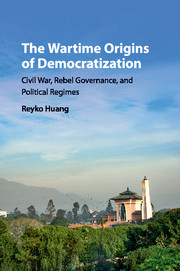Book contents
- Frontmatter
- Contents
- List of Figures
- List of Tables
- List of Acronyms
- Acknowledgments
- 1 Introduction
- 2 War-Making, Mobilization, and Democratization
- 3 Rebel Governance: How Rebels Interact with Ordinary People During Conflict
- 4 Testing the Effects of Rebel Governance on Postwar Democratization
- 5 Tracing the Steps from War Time to Peace Time: Case Studies Overview
- 6 War and Change in Nepal
- 7 War and Postwar Regime Formation in Uganda, Tajikistan, and Mozambique
- 8 Conclusion
- Appendix Rebel Governance Dataset: Notes, List of Cases, and Summary Statistics
- Bibliography
- Index
4 - Testing the Effects of Rebel Governance on Postwar Democratization
Published online by Cambridge University Press: 05 September 2016
- Frontmatter
- Contents
- List of Figures
- List of Tables
- List of Acronyms
- Acknowledgments
- 1 Introduction
- 2 War-Making, Mobilization, and Democratization
- 3 Rebel Governance: How Rebels Interact with Ordinary People During Conflict
- 4 Testing the Effects of Rebel Governance on Postwar Democratization
- 5 Tracing the Steps from War Time to Peace Time: Case Studies Overview
- 6 War and Change in Nepal
- 7 War and Postwar Regime Formation in Uganda, Tajikistan, and Mozambique
- 8 Conclusion
- Appendix Rebel Governance Dataset: Notes, List of Cases, and Summary Statistics
- Bibliography
- Index
Summary
When rebel groups establish their operational bases and political structures among civilian populations, tapping into their labor, income, possessions, and information for their war efforts, two kinds of transformations occur. One is that it results in a set of politically mobilized citizens who are confronted with the regime's shortcomings and come to seek and expect political changes favorable to them. Evidence presented in Chapter 3 showed that rebels are most likely to seek civilian contributions where they lack funding from other sources, especially foreign support. The other transformation is that in order to effectuate and sustain this extractive relationship with civilians, some rebel groups become “statebuilders” over time, essentially replacing some of the state's authority and institutions with their own. I find that this is most likely to occur where rebels rely extensively on civilians and lack other funding sources, control territory, and espouse an ideology that emphasizes popular mobilization, and where wars are long-lasting.
Each of these wartime transformations, I hypothesize, has enduring effects that carry over into postwar politics. Civilian mobilization makes it politically costly for postwar elites to ignore the restive public, creating incentives to introduce pro-social reforms as they consolidate the new postwar regime. Rebel statebuilding leaves the actual wartime institutions – their systems, norms, and practices – for postwar rulers to contend with. Should the rebels prevail in the war, they may choose to retain these institutions and adapt them to postwar politics to facilitate the war-to-peace transition.
This chapter assesses these theoretical propositions through statistical analysis using the 1950–2006 Rebel Governance Dataset (RGD) described in the previous chapter. Democratization in the post–civil war context, I contend, will be shaped by more than the “usual suspects” that explain democratization in peaceful contexts – they will have wartime origins. Regression results, obtained using several different measures of democratization and put under a variety of robustness checks, consistently show support for the civilian mobilization hypothesis: rebels’ wartime extraction from civilians is associated with greater postwar democratization compared with cases in which rebels depended little on civilians. I further find that rebel statebuilding, rather than laying the foundation for later democratization, is instead weakly associated with postwar autocratization when the rebels prevail in the war.
- Type
- Chapter
- Information
- The Wartime Origins of DemocratizationCivil War, Rebel Governance, and Political Regimes, pp. 83 - 109Publisher: Cambridge University PressPrint publication year: 2016
- 1
- Cited by



